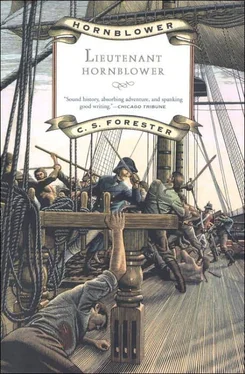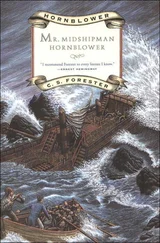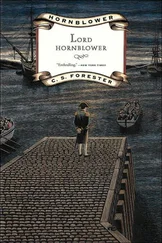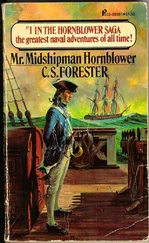“Weak,” said Clive.
Bush looked round at Hornblower, hoping that he would ask the questions that Bush wanted asked. Hornblower’s face was set in a mask without expression. His glance was fixed penetratingly on Clive, but he did not open his mouth. It was Lomax, the purser, who asked the question in the end.
“Is he sensible?”
“Well—” said Clive, glancing sidelong at Buckland. Clearly the last thing Clive wanted to do was to commit himself definitely regarding the captain’s sanity. “He’s too weak at present to be sensible.”
Lomax, fortunately, was inquisitive enough and bullheaded enough not to be deterred by Clive’s reluctance.
“What about this concussion?” he asked. “What’s it done to him?”
“The skull is intact,” said Clive. “There are extensive scalp lacerations. The nose is broken. The clavicle—that’s the collarbone—and a couple of ribs. He must have fallen headfirst down the hatchway, as might be expected if he tripped over the roaming.”
“But how on earth did he come to do that?” asked Lomax.
“He has not said,” answered Clive. “I think he does not remember.”
“What?”
“That is a usual state of affairs,” said Clive. “One might almost call it symptomatic. After a severe concussion the patient usually displays a lapse of memory, extending back to many hours before the injury.”
Bush stole a glance at Hornblower again. His face was still expressionless, and Bush tried to follow his example, both in betraying no emotion and in leaving the questioning to others. And yet this was great, glorious, magnificent news which could not be too much elaborated on for Bush’s taste.
“Where does he think he is?” went on Lomax.
“Oh, he knows he’s in this ship,” said Clive, cautiously.
Now Buckland turned upon Clive; Buckland was hollow-cheeked, unshaven, weary, but he had seen the captain in his berth, and he was in consequence a little more ready to force the issue.
“In your opinion is the captain fit for duty?” he demanded.
“Well—” said Clive again.
“Well?”
“Temporarily, perhaps not.”
That was an unsatisfactory answer, but Buckland seemed to have exhausted all his resolution in extracting it. Hornblower raised a masklike face and stared straight at Clive.
“You mean he is incapable at present of commanding this ship?”
The other officers murmured their concurrence in this demand for a quite definite statement, and Clive, looking round at the determined faces, had to yield.
“At present, yes.”
“Then we all know where we stand,” said Lomax, and there was satisfaction in his voice which was echoed by everyone in the wardroom except Clive and Buckland.
To deprive a captain of his command was a business of terrible, desperate importance. King and Parliament had combined to give Captain Sawyer command of the Renown , and to reverse their appointment savoured of treason, and anyone even remotely connected with the transaction might be tainted for the rest of his life with the unsavoury odour of insubordination and rebellion. Even the most junior master’s mate in later years applying for some new appointment might be remembered as having been in the Renown when Sawyer was removed from his command and might have his application refused in consequence. It was necessary that there should be the appearance of the utmost legality in an affair which, under the strictest interpretation, could never be entirely legal.
“I have here Corporal Greenwood’s statement, sir,” said Hornblower, “signed with his mark and attested by Mr. Wellard and myself.”
“Thank you,” said Buckland, taking the paper; there was some slight hesitation in Buckland’s gesture, as though the document were a firecracker likely to go off unexpectedly. But only Bush, who was looking for it, could have noticed the hesitation. It was only a few hours since Buckland had been a fugitive in peril of his life, creeping through the bowels of the ship trying to avoid detection, and the names of Wellard and Greenwood, reminding him of this, were a shock to his ears. And like a demon conjured up by the saying of his name, Wellard appeared at that moment at the wardroom door.
“Mr. Roberts sent me down to ask for orders, sir,” he said.
Roberts had the watch and must be fretting with worry about what was going on below decks. Buckland stood in indecision.
“Both watches are on deck, sir,” said Hornblower, deferentially.
Buckland looked an inquiry at him.
“You could tell this news to the hands, sir,” went on Hornblower.
He was making a suggestion, unasked, to his superior officer, and so courting a snub. But his manner indicated the deepest respect, and nothing besides but eagerness to save his superior all possible trouble.
“Thank you,” said Buckland.
Anyone could read in his face the struggle that was going on within him; he was still shrinking from committing himself too deeply—as if he was not already committed!—and he was shrinking from the prospect of making a speech to the assembled hands, even while he realised the necessity of doing so. And the necessity grew greater the more he thought about it—rumours must be flying about the lower deck, where the crew, already unsettled by the captain’s behaviour, must be growing more restive still in the prevailing uncertainty. A hard, definite statement must be made to them; it was vitally necessary. Yet the greater the necessity the greater the responsibility that Buckland bore, and he wavered obviously between these two frightening forces.
“All hands, sir?” prompted Hornblower, very softly.
“Yes,” said Buckland, desperately taking the plunge.
“Very well, Mr. Wellard,” said Hornblower.
Bush caught the look that Hornblower threw to Wellard with the words. There was a significance in it which might be interpreted as of a nature only to be expected when one junior officer was telling another to do something quickly before a senior could change his mind—that was how an uninitiated person would naturally interpret it—but to Bush, clairvoyant with fatigue and worry, there was some other significance in that glance. Wellard was pale and weak with fatigue and worry too; he was being reassured. Possibly he was being told that a secret was still safe.
“Aye aye, sir,” said Wellard, and departed.
The pipes twittered through the ship.
“All hands! All hands!” roared the bosun’s mates. “All hands fall in abaft the mainmast! All hands!”
Buckland went nervously up on deck, but he acquitted himself well enough at the moment of trial. In a harsh, expressionless voice he told the assembled hands that the accident to the captain, which they all must have heard about, had rendered him incapable at present of continuing in command.
“But we’ll all go on doing our duty,” said Buckland, staring down at the level plain of upturned faces.
Bush, looking with him, picked out the grey head and paunchy figure of Hobbs, the actinggunner, the captain’s toady and informer. Things would be different for Mr. Hobbs in future—at least as long as the captain’s disability endured. That was the point: as long as the captain’s disability endured. Bush looked down at Hobbs and wondered how much he knew, how much he guessed—how much he would swear to at a courtmartial. He tried to read the future in the fat old man’s face, but his clairvoyance failed him. He could guess nothing.
When the hands were dismissed there was a moment of bustle and confusion, as the watches resumed their duties and the idlers streamed off below. It was there, in the noise and confusion of a crowd, that momentary privacy and freedom from observation could best be found. Bush intercepted Hornblower by the mizzenmast bitts and could ask the question that he had been wanting to ask for hours; the question on which so much depended.
Читать дальше









